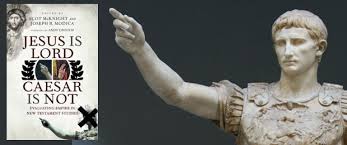
In an age of uncertainty and extreme skepticism about the Bible and Christianity, it is inevitable that there would be books written like Craig Blomberg’s lucid and balanced recent offering— Can We Still Believe the Bible? Just for clarification the question that Craig is asking is not ‘Can we Still believe in the Bible?’ Sometimes Protestants talk that way, and frankly that borders on bibliolatry. The Bible itself does not ask that we believe ‘in’ it, rather it points beyond itself to belief in God. What Craig is asking and answering is, can we still trust the Bible in regard to the things it intends to teach us about history, theology, ethics, and Craig would add some other subjects as well, whereas I would not. Here in this first post we have an interview with Craig about his helpful book. It will be followed by several posts summarizing and critiquing crucial ideas and themes in the book. Enjoy!
—-
1) What was it that prompted you to write this particular book?
I had agreed to write a bigger book for a different publisher on the historical reliability of the New Testament overall but kept coming up against areas where the so-called “aggressive atheists” of our day, a liberal fringe of scholars in religious studies, and a lot of lay bloggers were claiming there were all kinds of reasons to reject traditional beliefs about the Bible. Yet in six particularly prominent areas of study where these claims were being made, a broad cross-section of biblical scholars over the past generation have been amassing evidence that points to greater rather than lesser confidence in the Scriptures. But their findings are not what are being most publicized. So I decided first to write a smaller book focusing on just those topics.
2) You speak frequently about a change, even among the laity, in what I will call the mood of the culture when it comes to Christianity. What are the telltale signs in your mind? How do you see a book like this addressing that change, especially if we are now moving into a post-Christian, post-Biblical era in America?
When I was working on my various educational degrees in the 1970s, we were still reeling as a culture from Vietnam, Watergate, Woodstock and a generation of young adults who were often very disenchanted with traditional authority, including religious authority. Yet they were truly open-minded. They were interested in exploring religious options other than Christianity but they were also very open to exploring the evidence for Christianity, especially when it was combined with an authentic, relevant Christian lifestyle. So mixed among other kinds of hippies were a large number of “Jesus people,” many of whom had come out of alternative lifestyles.
If you organized an event on a secular college or university campus with a winsome, compelling speaker and did a reasonably good job at publicizing it, there was a good chance you would draw a large crowd and that a significant minority of the non-Christians in the audience would take significant steps closer to becoming followers of Jesus if not make the commitment on that very day. And those who didn’t at least had some general knowledge, even before they came to the event, of the worldview they were for the time being, at least, choosing to reject.
Today we see the children of that generation as young adults on the same campuses with the same Christian organizations, with even more compelling speakers and evidence on which to draw, and yet in many instances it is extremely difficult to get a good crowd, if you do you are lucky if even a few unbelievers come, and luckier still if any of them are drawn toward the faith. But it is not as if any new evidence has emerged that we didn’t know about a generation ago to make the case for faith weaker. Instead, people have grown up with less awareness of biblical claims, with more prejudice against Christianity, with an eagerness to embrace the most outlandish charges against the Bible without even wanting to research them at all, which really shows that they are looking for reasons not to believe rather than engaging in serious inquiry.
Perhaps most tragically, there are ex-Christians who were burned by the ugliest side of what gets included in the category of “Christian,” tar all Christians with the same brush, and go on the warpath against them. Such people have always been around, but it seems they appear today in the Western world in record numbers. And with the internet making anyone’s opinion accessible to everyone in the world, something we didn’t have in the 1970s or even 1980s the way we have had it in more recent decades, truth has become democratized in ways that few of us consciously think about very much. Democracy seems so good in so many arenas of life. But if 100 people tell you they see a princess standing in the road and 15 people tell you that it’s really a truck bearing down on you, and you believe the majority when there really is a truck and not a princess, the results are pretty tragic.
I hope that my book will help spread the word about a significant trend within the academy toward a more positive view of the Bible, a trend that is well-founded and ought to be taken seriously and carefully evaluated by anyone who wants to be well-educated and/or wants to evaluate religious claims.
3) One of the regular laments in this book is that Evangelicals engage in way too much in-fighting which is a poor witness. Some of the stories of Evangelicals attacking Evangelicals involve you personally, and there seems to be a good deal of personal pain in this book. Apart from your responses in this book, how have you handled such situations when you were the object of unfair criticism? What would you suggest we do to stop alienating young people from the faith by such bad behavior?
There are multiple ironies here. The New Testament contains both good and bad examples of “infighting.” On the one hand, Jesus and the apostles are remarkably gracious when it comes to outsiders or those “more liberal” than they. Jesus fraternizes with the most sinful and ostracized of his Jewish world and is sharply criticized for it. Paul says he tries to be all things to all people so that by all means he might save some (1 Corinthians 9:19-23). On the other hand both Jesus and Paul unleash blistering invective against the ultraconservative religious insiders of their communities (for Jesus, the Pharisees; for Paul, the Judaizers) who draw lines of whom they include as fully orthodox much more narrowly than they should and know better.
Sadly the evangelical Christian movement has often been far too critical and nasty towards those they deem further to the “left” than themselves while treating with kid gloves those who have moved too far to the “right.” And then when a few do try to call those abusing their power on the far right to account for their behavior, others decry their judgmentalism.
When I have been the object of unfair criticism, I have always tried to start by replying graciously. Where there is openness to a serious, courteous conversation I have tried to have one behind the scenes out of the public limelight. When that has failed, I have tried to apply Titus 3:10—“Warn a divisive person once, and then warn them a second time. After that, have nothing to do with them” (NIV). But when they have in return slandered or libeled me publicly and they fit into the camp of the ultraconservative religious insider who knows better, especially when they have made a career of behaving that way, I have tried to be obedient to Scripture and call them out in a similar public venue to warn others about them. This, of course, is very unpopular and countercultural in today’s world and so it is also often misunderstood. But I attend a church that is dominated by twenty- and thirty-somethings and I have found that, of all the generations, they more than any appreciate responding to the diversity of our world courteously and to the far-right-wingers of our movement with clear rejection.
4) A constant theme in your book is balance, and fairness, which seems to be in short supply in an age of rants on blogs, and smoke filled room politics in various Evangelical churches, organizations, academic conferences. How do you suggest we build in more accountability for words and actions that are unChristian in character, and yet exhibited by Evangelicals?
I wish I had a good answer for you. The biblical model is for every believer to be an active member of a local Christian community that exercises loving church discipline in a way that would monitor such behavior and help people grow out of it. But, in my experience, most of the worst offenders either go to churches whose leadership is like-minded and therefore will not call them to account or to churches that don’t exercise any healthy forms of accountability or don’t go to church regularly or simply don’t have anyone in their lives with that kind of balance to whom they submit for any accountability. I suppose all I can do is appeal to Matthew 7:12 (the famous Golden Rule) and remind them that Jesus taught them not to treat others in any way they would object to if they were so treated.
5) Your chapters on text criticism, the canon, and translations are very useful summaries of answers to usual objections by people looking for excuses to avoid any serious engagement with the claims of the Christian faith. Do you think that removing obstacles to faith set up by false dichotomies, and the hyperbolic rhetoric by more radical Biblical scholars and the like is essential these days considering the cultural climate?
Yes, absolutely. I had a professor in seminary years ago who was well-known for teaching his students about how many different exegetical and theological debates they could resolve by what he called “both-and” rather than “either-or.” Of course, this can’t always work, logically it is impossible to combine belief in Jesus’ sinfulness with belief in sinlessness and come up with something halfway in between. Even one sin would have made Jesus sinful. But the debate between Calvinism and Arminianism won’t ever be solved by affirming one side in a thoroughgoing way; there is just too much biblical support for both sides. Although purists in both camps lampoon what is sometimes called “Calminianism,” I am absolutely convinced that the only way forward lies in working on syntheses of the best of both systems.
I love the way you in many of your books deal with eternal security by saying there is no eternal security until we are securely in eternity. So, as a pretty committed Wesleyan yourself, you recognize that in the eternal state there is an infinity of time in which we are eternally secure. Howard Marshall, another Wesleyan stresses that as long as we believe we absolutely have security, but that doesn’t prevent someone from total apostasy (the only way to forfeit salvation). On the other hand, Calvin dealt with the seed that fell in the rocky soil and the seed that was choked out by thorns and thistles as referring to people who had what he called “temporary faith” but demonstrated over time that they were not truly believers at all, because they bore no fruit of belief. Unfortunately not all of Calvin’s and Wesley’s followers have been this careful about affirming the truth in the other “camp.”
Applying this both-and approach to one of the three issues you mentioned, I try in the chapter in my book on English translations of the Bible to stress the value of all non-sectarian translations of Scripture. Each was produced for distinctive purposes and must be used for those purposes. No one translation is best for all situations in which people use Bibles. But all of them are adequate. If we could only have one Bible on a desert island and someone else got to pick it for us, we shouldn’t be worried about which one we received (again, excepting those produced by certain Christian sects or cults), even if we didn’t get our first choice.
As for issues of text and canon, yes, we need to debunk and keep on debunking the wildly simplistic and vastly overgeneralized claims that there are so many textual variants that we cannot know with any confidence anywhere what the books of the Bible originally contained, and that the canon is just a collection of books chosen by the winners in a protracted and unfair debate!
6) Inerrancy is an issue that seems to be more of an issue among Reformed Evangelicals than Arminian ones. Why do you think that is?
The classic exponent of comparatively recent American inerrantism was B. B. Warfield, a Princeton theologian and Presbyterian and Reformed scholar of about a century ago. Mark Noll, a prolific American evangelical church historian, has pointed out that the more Calvinistic wing of Christianity valued higher education and theological education earlier and more widely in the settling of American than the more Wesleyan-Arminian wing. And these debates tend to go on among scholars much more so than among the average Christian, unless those Christians have been provoked by scholars they trust into making it a big issue. That doesn’t mean inerrancy isn’t a very important topic, but it is at least, I think, a partial answer to the question of why it is more of an issue among Reformed than among Arminian evangelicals.
7) It seems odd to me that in the post-modern environment, where there is so much curiosity about and interest in the paranormal, that the very people who are all too ready to believe all sorts of strange claims about odd phenomena, at the same time will not even walk across the street to learn about miracles in the Bible or in a Christian context. What do you make of this?
It seems very odd to me too. One all-too-common answer is that these are people who have been hurt, sometimes traumatically so, by the uglier side of ultraconservative Christianity. They are not inherently closed-minded people. They have just had their fill of being abused by people in Jesus’ name. The Evangelical movement, especially its most right-wing and/or heavy-handed segments have to shoulder some significant blame for this reaction. In other cases, though, it seems that it is just that people recognize how much is at stake with the Christian claims. If Buddhism turns out to have no spiritual reality to it, at least in its sanitized, highly selective Western forms of practicing it, little harm is done and nothing much is at stake. But if Christianity is true, it calls for people to absolutely surrender running their own lives by themselves and submitting to the God of the entire universe. Never mind that he knows best what is best for us, we find it very difficult in a modern, democratic society to countenance the submission of our lives to anyone else. Never mind that God has promised to give us what we want, including eternal separation from him and all of his people if we continue to reject him, we simply can’t fathom how much better off we would be if we followed him instead. It’s like C. S. Lewis’ famous example of the child who trades the offer of a holiday by the seaside for continuing to make mud pies in the slums!
8) Certainly one of the key themes of your book is that we must avoid anachronism in our reading of the Bible, and must not evaluate it on the basis of modern criteria and issues. For example, we must interpret the Bible in light of various ancient genre of literature and their conventions which were used in Biblical times. This of course requires study and the learning of ancient Biblical contexts and practices. What do you say to our more charismatic friends who respond to such exhortations by saying “I don’t know why I need to learn all this history (etc.). Why I can just get into the pulpit and the Spirit gives me utterance”.???
I’ve heard some of those utterances! It’s pretty sad to blame them on the Spirit. The only context in Scripture in which the Bible promises to give us words to speak that we haven’t thought about or prepared is when we are unexpectedly dragged before the hostile powers of our world (Luke 21:12-15). Of course, God is sovereign and can and does empower to speak better than they would otherwise have known how to in numerous situations, but there is no blanket promise that he will do this consistently. Over my lifetime I’ve heard of countless individuals who have left churches because their preachers were too often adopting the philosophy you’ve described but all the congregations were receiving was drivel.













